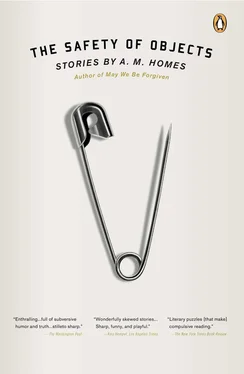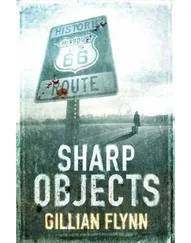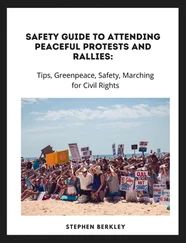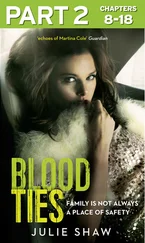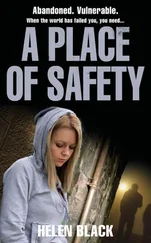“It’s warm,” the girl said.
“He’s not dead, you know,” Cindy said, and the girl blushed, turned red like a maraschino cherry.
“You’re gross,” Cindy said, and she pulled up the sheets and tucked him in.
She tucked Paul in like he was a baby. She was gentle because she hated him.
I tell them about how my daughter came into the kitchen while I was talking on the phone. “I hate him,” she said. “I hate him so much that sometimes I think I’m going to do something terrible.” I told the person I was talking to I’d have to call back. “It must be so difficult for you,” she said.
Cindy cried, and I told her it was all right. I told her it was perfectly normal to feel that way. I told her I felt that way too.
She said, “No, Mom, it’s different, it’s different for me, I’ve always hated him.”
* * *
Welcome to the Museum. For your admission fee I show you everything, tell it all, saving the best for last. I bring you down the hall to his room. I explain that what you smell — a sweet, heavy odor, with lingering bitterness, a sharp cleanser-like aftertaste — is the perfume of the living dead. Breathe with your mouth open.
It’s after four o’clock in the morning and I’m in Paul’s room. I sit next to his bed and notice that if I look at just one part of him, an ankle or a hand, he doesn’t seem so terribly damaged. If I look at anything bigger than a couple of inches, I see him pale and rigid, slightly puffy, frozen in a nightmare. I sit and talk to Paul and I ask him what I’m supposed to do.
“Paul?”
He doesn’t answer, or tell me to get out. Paul doesn’t explain things like he used to. He doesn’t say he’s hearing Led Zeppelin in his head, and it sounds so loud that he thought for a minute the stereo was on. He doesn’t tell me his head is like some sort of wonderful stereo because there’s always music in it, always the songs he wants to hear. He doesn’t say he’s commercial-free. I brush his hair back with my fingernails and think about how it’s getting sort of long again. He doesn’t pull away, doesn’t say, “God, Mom, leave me alone, okay?” Paul doesn’t tell me what the hell happened. He doesn’t apologize.
I sit in Paul’s room until I’m sure I’ll do the right thing. I’m with my baby and every thought is connected to him. I know that if I just sit there, I’ll stay forever.
I get up and empty his trash can. I take the bag into the kitchen and leave it by the door. I open a new box of Hefty’s and go back into his room. In front of him, I open the bag, I shake it until it’s filled with air. I go to Paul, pull the oxygen tube out of his nose, lift his head, and slide the bag over it. I put the bag on slowly hoping he’ll stop me, twist away. I slide the bag over his head and pull it tight around his neck, wishing he’d fight. As I do it, I see myself in the mirror of his window.
I watch my reflection and when I see what I’m doing, I quickly lean over Paul and turn off the light. I stop anyone else from seeing me. The room goes black except for small red lights on Paul’s machines, lights that say everything is working perfectly.
I look at Paul. I see how easy it’s been to tie the bag around his head. I watch him with the bag over his head, tied around his neck. He breathes, pulling the bag up close against his features, his nose, eyes, mouth pressing against it. I watch him exhale. His breath pushes against the dark green plastic; the bag puffs out like a balloon. I close the bag tighter around him, thinking the less time it takes the better, thinking I want it over fast. I want the end.
I hold the bag while Paul breathes, and after a minute or a few minutes, he doesn’t breathe as well. He breathes less, as though he’s tired. He is barely breathing and I know I could still stop it. I could stop myself from becoming a murderer, but don’t.
If I don’t do this now, I’ll regret it, and only have to do it later. Later everything will become harder and will always become harder until it’s over. I push the bag into his face, into his mouth, into his nose, and finally he takes a breath, lets out a breath, and is still.
I take the bag, moist with his breath, away from him. I lift his head, pull the bag off, and close it. I sit beside his bed until I am sure the breath was his last, until I am sure he won’t start breathing again when I’m not looking.
I press my head to his chest, to his lungs, his heart. I press my face to his face, there’s sweat on it. I feel the skin go cold. I press my face to his face and feel him die. I sit in his room until I’m sure the end has come and gone, until morning comes. The sun comes up, crossing behind the houses at the end of the street. I sit thinking how easy it was, how simple it seemed. From now on I will always know where Paul is. I will always know how he is. I think about Cindy, Harold, my parents, and how at any moment something could happen, an incomplete accident, and again, I’d be waiting. I think about the number of Hefty bags in a box. It’s six o’clock in the morning. I’m back in my bed, my body pressed against Harold’s. In his sleep he wraps himself around me. I am trapped. He snores, his chest presses against my back. His breath blows on the crown of my head, a strange hot and sour breeze.
In the woods behind someone’s house Ben and Sally gathered leaves and lit them on fire.
Ben struck two matches at once without ripping them out of the pack. He touched the burning matches to as many leaves as he could before the whole pack ignited and burned into his fingers.
The fire grew and Ben pushed Sally back a couple of feet. “Move,” he said.
The two of them stood in the leaves, sometimes in the fire, the flames sometimes reaching out to the bottoms of their jeans. Sally bent into the fire and pulled out a burning leaf. She held the leaf between two fingers and watched it dissolve into an edge of red ember that left only the hard stern in her hand.
“Get some more,” Ben said. They gathered leaves again and again, moving farther into the woods each time, bending to the ground and scooping them up in their arms, carrying back what seemed like entire forests pressed to their chests.
As she bent to pick up leaves, Ben poked Sally between the legs with the stick he had used to stir the fire. She pretended to ignore him. Ben pushed the stick back and forth, rubbing it not so much against Sally’s crotch as along the inside of her thighs, scratching against her jeans.
As he poked her he laughed, not a regular funny laugh but higher-pitched, like a maniac on the loose.
Sally looked at him the same way her mother sometimes looked at her father and said, “Quit it.”
They lit fires, each one bigger than the last until the flames started jumping wildly and as they stamped them out the bells of their jeans caught fire and the denim glowed red and they could feel the heat on their clean white calves.
The woods filled with smoke and the edge of one of the fires got loose and Ben had to chase after it. Far off they heard sirens, and Sally thought for sure they were for them.
Finally, when they’d scared themselves sufficiently, when both of Ben’s legs were covered with bright red burns so hot they felt cold, he and Sally sat down on the dirt and Sally pulled a pack of Marlboros from the hiding place in her sock.
She shook out one for each of them, then stuffed the pack back into her sock. Ben lit both cigarettes and for a minute held both between his lips smoking two at once, as though doubling the amount doubled the pleasure, doubled the fun.
“That was good,” Ben said as he smoked.
Sally nodded and didn’t say anything. She was practicing inhaling and didn’t want to break her concentration.
Читать дальше
